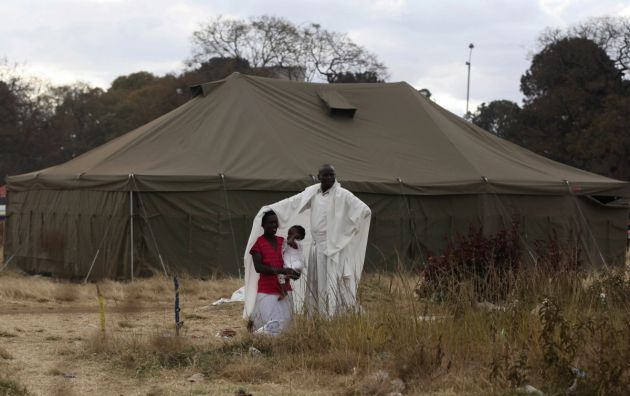Zimbabweans rise up against life that priest says 'is unbearable now'

Violent protests in a Zimbabwe with 90 percent unemployment reflect people's frustrations in extremely difficult times, a Catholic Church official has said.
"Life is unbearable now for most people" in the southern African. Father Frederick Chiromba, secretary-general of the Zimbabwe Catholic Bishops' Conference, told Catholic News Service, referring to poverty levels in the southern African nation.
Thousands of people joined a July 6 national strike over grievances, including the government's failure to pay State workers' salaries, national cash shortages and new import controls.
The man behind the protests is Pastor Evan Mawarire who said he started the #ThisFlag movement six weeks ago to get his countrymen to unite against "rampant and runaway corruption by government and government ministers," South Africa's bdlive.co.za reported.
"We have called for a complete shutdown of the country today in protest of the government that has completely failed to look after its citizenry' and failed to listen to the demands of its citizenry'" he said of the protest.
The evangelical pastor, who reportedly has no church, was quoted by bdlive as telling Talk Radio 702 that the Zimbabwe government had failed to "deal with injustices and deal with poverty."
"We just said' 'Enough is enough'. We will take a day out to deliver our message to government for them to know that its citizens were serious about having a Zimbabwe that actually works.
"It has gone on too long' gone unchecked for too long' the situation has become untenable."
He said they hoped for "banks to be closed' schools to be closed and businesses to be closed' everyone to be staying at home" and for there to be no public transport available and he said he started the movement in part because he could not pay school fees.
Mawarire stressed #ThisFlag was not political' nor "a union that has been around for years"' but a movement that was started recently and the people of Zimbabwe quickly "identified" with its message.
The Zimbabwe Heads of Christian Denominations said in a July 5 statement that the country's challenges require "collective concerted efforts, wisdom, insight, cooperation and collaboration of all stakeholders and concerned friends."
Chiromba is executive secretary of the umbrella group, which includes the Catholic bishops' conference, the Zimbabwe Council of Churches and the Evangelical Fellowship of Zimbabwe.
Zimbabwe is "undergoing a very difficult patch, economically, socially, politically and spiritually," the church leaders said.
ANGRY TAXI OPERATORS
Taxi operators and angry youths clashed with police in Zimbabwe's capital, Harare, July 4 as they objected to roadblocks they said the police used to solicit bribes.
Other violent protests included the razing of a warehouse in early July at Zimbabwe's border posts with South Africa after the Zimbabwean government banned imports of a wide range of foodstuffs and other products.
Protesters in Beitbridge, a town about 400 miles (644 miles) south of Harare, bordering South Africa, blocked a road with rocks and burning tires July 2, forcing the temporary closure of the border post.
The 92-year-old President Robert Mugabe has ruled with an iron fist since independence from Britain in 1980 and civil unrest has been rare.
"Clearly, what legacy would Mugabe leave for the country if everything that has been built during his long rule could end up being destroyed?" the NewsDay newspaper asked in an editorial.
"If anything, Mugabe should, for once listen, to sound advice from allies both in his Zanu PF [ruling party] and his peers in Africa and step down for the good of the country."
CNS reported that Mugabe's administration spends more than 80 percent of its revenue on wages for government workers, but is facing a worsening cash shortage.
To stem hyperinflation, Mugabe's government abandoned its own currency in 2009 and uses mainly U.S. dollars.
The government "must provide the necessary leadership by clear and consistent communication on policy matters to avoid creating more chaos in an already chaotic situation," the church leaders said.
Chiromba said the government is to blame for inconsistent policies, such as "the sudden banning of imports which has destroyed people's livelihoods" and lack of effective leadership.
"We need to revive the economy," he said, noting that formal sector retrenchments continue as industries close. He said the number of jobless youths is alarming.
Zimbabwe has a population of close to 16 million, and many people survive on $1 a day. They eke out a living in small-scale informal trade, mostly selling goods bought in South Africa.
"Groceries cannot be sent across the border from South Africa, which creates difficulties for families who rely on these," following a a ban on imports from South Africa on June 17, Father Chiromba said.
Zimbabweans who rely on remittances from family members in the diaspora "are also suffering" as amounts dwindle in the global economic downturn, he said.
The bishops' conference has launched an emergency appeal for food aid and is distributing contributions as well as making cash transfers to people in dire need, the Catholic priest said.
Exacerbating the poor government decision-making is an ongoing drought spuured on by the El Nino climate effect.
The Zimbabwean church leaders said they "strongly believe that sustained dialogue provides the pathway" to resolving the country's problems.
"We believe that everyone wants a Zimbabwe that is peaceful, prosperous and united," they said.
Noting their opposition to violence, destruction of property and loss of life, the leaders urged "restraint and tolerance as people express their constitutional rights."
Zimbabweans "must air grievances using the frameworks provided by the law," they said.